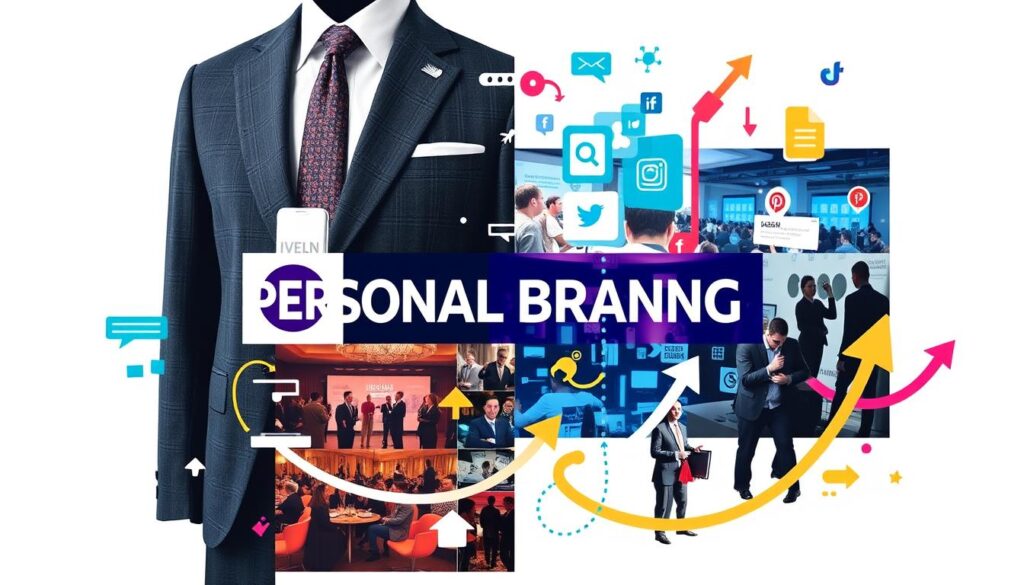Understanding effective career development strategies is key in today’s job market. It’s not just about moving up in your job. It’s about planning your career in a well-rounded way. This includes learning new things and improving your skills to navigate your career path.
By taking part in this process, you can match your goals with what the industry needs. This ensures a promising future in your professional life.
Key Takeaways
- Career development is essential for long-term professional growth.
- Identifying your career goals is a foundational step in career planning.
- Continuous learning enhances your skills and marketability.
- Networking is vital for accessing job advancement opportunities.
- Building a personal brand can significantly impact your career trajectory.
- Internal job postings can provide a pathway for career growth within organizations.
Understanding the Importance of Career Development
The journey in managing one’s career starts by understanding career development. This ongoing process matches personal interests with professional goals. It helps individuals navigate their work life smoothly. Career development includes getting new skills, learning more professionally, and building strong networks.
Defining Career Development
Career development is key for moving up in your career. It’s not just about formal training and classes but also about knowing yourself and planning ahead. Those who commit to this path often take big steps. They realize their potential and get better jobs in their field.
Benefits of Investing in Your Career
Knowing the benefits of career investment is crucial for smart choices. Investing in your career means more job happiness and a rewarding work life. Also, prioritizing professional growth leads to better job chances and higher earnings. Research, including Bureau of Labor Statistics reports, shows that developing skills secures jobs and promotes career progression. Planning your career growth wisely brings long-term success.
Assessing Your Current Job Situation
Evaluating your job situation is key for growth. It helps you see what you’re good at and what needs work. By understanding these, you can develop and move forward in your career. Also, setting clear career goals is crucial. It guides you on what steps to take next.
Identifying Strengths and Weaknesses
Finding your strengths and weaknesses is important. You can use different ways to review your job performance:
- Performance reviews offer feedback from bosses and coworkers.
- Self-reflection exercises help you evaluate your job role.
- Peer assessments provide opinions from others about your skills.
This mix of feedback helps you understand your skills better. It also shows where you need to improve.
Setting Career Goals
Having clear career goals is essential for success. The SMART criteria turn these goals into achievable steps:
- Specific: Clearly describe what you want to achieve.
- Measurable: Use measures to check your progress.
- Achievable: Make sure your goals are realistic.
- Relevant: Your goals should fit your long-term career plans.
- Time-bound: Set deadlines for reaching your goals.
Getting feedback from coworkers and bosses also helps. It can give you valuable insights and refine your goals even more.

| Criteria | Importance | Benefits |
|---|---|---|
| Self-Assessment | High | Enhances self-awareness |
| Strengths Identification | Medium | Helps assign roles effectively |
| Weaknesses Identification | High | Aids in focusing on skill development |
| SMART Goals | High | Makes goals clear and focused |
Career Development: Effective Networking Strategies
Success in your career often depends on good networking. Strong professional ties can lead to new chances and valuable career tips. Making these connections is key in the tough job world of today.
Building Professional Relationships
Meeting people face-to-face is still very powerful for building work relationships. Going to industry events and local gatherings helps you meet peers and mentors. Having deep talks can make these bonds stronger, making it easier to keep in touch later. Always try to keep up with these folks and help out when you can.
Leveraging Social Media for Networking
Networking on social media is huge for growing your work circle. Sites like LinkedIn let you meet mentors and show off your wins. Join in on discussions and post about what you know well to stand out. This can get you noticed by big names in your field who might help or offer jobs.

Enhancing Skills for Career Advancement
Thriving in today’s job market means improving your skills. It’s key to know what you’re good at and where you could do better. Learning more and gaining new skills is vital. This could mean getting professional certifications or finding a mentor.
Identifying Skill Gaps
Knowing where you need to improve starts with a self-review. It helps to ask coworkers and bosses what they think too. You can find out what skills you’re missing by:
- Thinking about projects that were hard for you.
- Looking at job ads for the roles you want.
- Getting feedback from peers.
Continuous Learning and Certification Options
Finding your skill gaps is just the start. Then, you need to keep learning. You can do this through:
- Taking online courses on websites like Coursera and Udemy.
- Joining workshops on topics like project management.
- Earning certifications from groups like PMI or SHRM.
This learning boosts your skills and makes you more valuable at work.
Seeking Feedback and Mentorship
A mentor can really speed up your career growth. They give great advice and help you face work challenges. Mentors are great for:
- Getting a clear view of your skills and future.
- Finding new chances that fit your dreams.
- Meeting people in your industry to help you succeed.
Creating a Personal Brand
In today’s job market, it’s key to build an effective personal brand for career growth. Personal branding shows off your professional self to employers and peers. It helps you stand out and manage how you’re seen professionally.
Understanding Personal Branding
Personal branding is about creating and keeping up your brand identity. It includes qualities like skills, experiences, and values that others can connect with. You need to be consistent across platforms to show who you are and what you value. This helps you tell your unique story to potential employers, leading to great connections and chances.
Essential Elements of a Strong Personal Brand
Key elements make a personal brand strong. These are:
- Clarity of Purpose: Knowing your goals helps define your brand identity.
- Distinctiveness: Showing off unique skills and experiences makes you stand out.
- Consistency: Staying active across different platforms keeps your brand strong and recognizable.
The table below shows strategies to build a personal brand and their benefits:
| Strategy | Benefit |
|---|---|
| Develop a professional online presence | Increases visibility and credibility |
| Network with industry professionals | Expands opportunities and resources |
| Showcase achievements through case studies or a portfolio | Demonstrates proven expertise and success |
| Seek endorsements and testimonials | Boosts reputation management and trustworthiness |

Navigating Career Opportunities within Your Organization
Understanding internal job dynamics is key for career growth. By knowing how companies promote openings and the traits sought after, employees can better prepare. Such knowledge positions them well for moving up.
Understanding Internal Job Postings
Internal jobs let employees seek new roles. They detail the job’s duties, needed skills, and experience. Knowing these details aids in aligning one’s qualifications with job requirements. Looking at past postings gives clues about successful candidates.
Communicating Career Aspirations with Management
Talking about career goals is crucial. It strengthens relationships with bosses. Workers should clearly share their ambitions through meetings, performance reviews, and casual talks.
- Scheduling regular meetings to discuss career goals.
- Engaging in performance reviews to highlight readiness for new challenges.
- Participating in informal discussions to keep management informed of interests.
Expressing career goals clearly helps grow within a company. It shows management your drive and opens up future opportunities.
Conclusion
Effective career growth is key for anyone looking to get ahead. Through this article, we’ve touched on the need for ongoing career planning. It involves knowing yourself, connecting with others, improving your skills, and building your brand. These steps help you know where you are and where you want to be.
Career planning is super important. By being proactive, you can better face the future of your career. It’s about more than climbing the career ladder. It’s about finding what you love to do and doing it well to be both happy and successful.
The big message? Keep working on your career growth. Using the strategies we talked about is investing in your future. Start now on the road to reaching your career dreams.



















